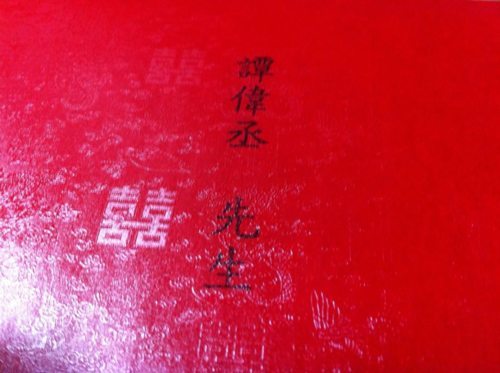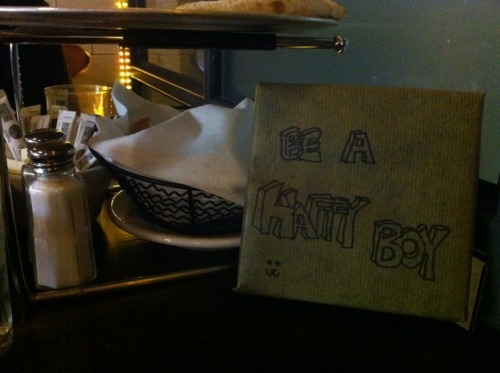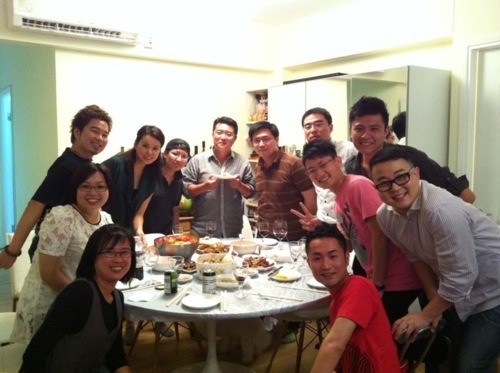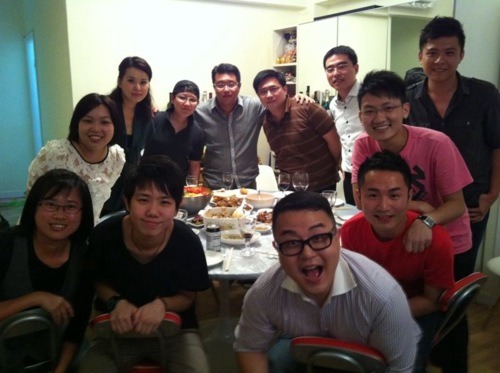2011年12月11日 星期日
Marry The Night
2011年12月9日 星期五
2011年12月6日 星期二
2011年11月30日 星期三
How to Identify and Learn from Your Mistakes
How to Identify and Learn from Your Mistakes
It’s never easy to admit you’ve made a mistake, but it’s a crucial step in learning, growing, and improving yourself. Writer and speaker Scott Berkun’s new essay collection, Mindfire: Big Ideas for Curious Minds, examines, among other things, how to learn from your mistakes. In this excerpt, Berkun discusses four of the most common kinds of mistakes, how to recognize them, and how, in turn, to learn from them.
You can only learn from a mistake after you admit you’ve made it. As soon as you start blaming other people (or the universe itself), you distance yourself from any possible lesson. But if you courageously stand up and honestly say “This is my mistake and I am responsible” the possibilities for learning will move towards you. Admission of a mistake, even if only privately to yourself, makes learning possible by moving the focus away from blame assignment and towards understanding. Wise people admit their mistakes easily. They know progress accelerates when they do.
This advice runs counter to the cultural assumptions we have about mistakes and failure, namely that they are shameful things. We’re taught in school, in our families, or at work to feel guilty about failure and to do whatever we can to avoid mistakes. This sense of shame combined with the inevitability of setbacks when attempting difficult things explains why many people give up on their goals: they’re not prepared for the mistakes and failures they’ll face on their way to what they want. What’s missing in many people’s beliefs about success is the fact that the more challenging the goal, the more frequent and difficult setbacks will be. The larger your ambitions, the more dependent you will be on your ability to overcome and learn from your mistakes.
But for many reasons admitting mistakes is difficult. An implied value in many cultures is that our work represents us: if you fail a test, then you are a failure. If you make a mistake then you are a mistake (You may never have felt this way, but many people do. It explains the behavior of some of your high school or college friends). Like eggs, steak and other tasty things we are given letter grades (A, B, C, D and F) organizing us for someone else’s consumption: universities and employers evaluate young candidates on their grades, numbers based on scores from tests unforgiving to mistakes.
For anyone who never discovers a deeper self-identity, based not on lack of mistakes but on courage, compassionate intelligence, commitment and creativity, life is a scary place made safe only by never getting into trouble, never breaking rules and never taking the risks that their hearts tell them they need to take.
Learning from mistakes requires three things:
- Putting yourself in situations where you can make interesting mistakes
- Having the self-confidence to admit to them
- Being courageous about making changes
The Four Kinds of Mistakes
One way to categorize mistakes is into these categories:
- Stupid: Absurdly dumb things that just happen. Stubbing your toe, dropping your pizza on your neighbor’s fat cat or poking yourself in the eye with a banana.
- Simple: Mistakes that are avoidable but your sequence of decisions made inevitable. Having the power go out in the middle of your party because you forgot to pay the rent, or running out of beer at said party because you didn’t anticipate the number of guests.
- Involved: Mistakes that are understood but require effort to prevent. Regularly arriving late to work/friends, eating fast food for lunch every day, or going bankrupt at your start-up company because of your complete ignorance of basic accounting.
- Complex: Mistakes that have complicated causes and no obvious way to avoid next time. Examples include making tough decisions that have bad results, relationships that fail, or other unpleasant or unsatisfying outcomes to important things.
I’m leaving all philosophical questions about mistakes up to you. One person’s pleasure is another person’s mistake: decide for yourself. Maybe you enjoy stabbing your neighbor’s cat with a banana, who knows. We all do things we know are bad in the long term, but are oh so good in the short term. So regardless of where you stand, I’m working with you. However mistakes are defined in your personal philosophy this essay should help you learn from them.
Learning from mistakes that fall into the first two categories (Stupid & Simple) is easy, but shallow. Once you recognize the problem and know the better way, you should be able to avoid similar mistakes. Or in some cases you’ll realize that no matter what you do once in a while you’ll do stupid things (e.g. even Einstein stubbed his toes).
But these kinds of mistakes are not interesting. The lessons aren’t deep and it’s unlikely they lead you to learn much about yourself or anything else. For example compare these two mistakes:
- My use of dual part harmony for the 2nd trumpets in my orchestral composition for the homeless children’s shelter benefit concert overpowered the intended narrative of the violins.
- I got an Oreo stuck in my underwear.
And since there isn’t much to learn from simple and stupid mistakes, most people try to minimize their frequency and how much time we spend recovering from them. Their time is better spent learning from bigger mistakes. But if we habitually or compulsively make stupid mistakes, then what we really have is an involved mistake.
Involved Mistakes
The third pile of mistakes, Involved mistakes, requires significant changes to avoid. These are mistakes we tend to make through either habit or nature. But since change is so much harder than we admit, we often suffer through the same mistakes again and again instead of making the tough changes needed to avoid them.
Difficultly with change involves an earlier point made in this essay. Some feel that to agree to change means there is something wrong with them. “If I’m perfect, why would I need to change?” Since they need to protect their idea of perfection, they refuse change (Or possibly, even refuse to admit they did anything wrong).
But this is a trap: refusing to acknowledge mistakes, or tendencies to make similar kinds of mistakes, is a refusal to acknowledge reality. If you can’t see the gaps, flaws, or weaknesses in your behavior you’re forever trapped in the same behavior and limitations you’ve always had, possibly since you were a child (When someone tells you you’re being a baby, they might be right).
Another challenge to change is that it may require renewing commitments you’ve broken before, from the trivial “Yes, I’ll try to remember to take the trash out” to the more serious “I’ll try to stop sleeping with all of your friends”. This happens in any environment: the workplace, friendships, romantic relationships or even commitments you’ve made to yourself. Renewing commitments can be tough since it requires not only admitting to the recent mistake, but acknowledging similar mistakes you’ve made before. The feelings of failure and guilt become so large that we don’t have the courage to try again.
This is why success in learning from mistakes often requires involvement from other people, either for advice, training or simply to keep you honest. A supportive friend’s, mentor’s or professional’s perspective on your behavior will be more objective than your own and help you identify when you’re hedging, breaking or denying the commitments you’ve made.
In moments of weakness the only way to prevent a mistake is to enlist someone else. “Fred, I want to play my Gamecube today but I promised Sally I wouldn’t. Can we hang out so you can make sure I don’t do it today?” Admitting you need help and asking for it often requires more courage than trying to do it on your own.
The biggest lesson to learn in involved mistakes is that you have to examine your own ability to change. Some kinds of change will be easier for you than others and until you make mistakes and try to correct them you won’t know which they are.
How to Handle Complex Mistakes
The most interesting kinds of mistake are the last group: Complex mistakes. The more complicated the mistake you’ve made, the more patient you need to be. There’s nothing worse than flailing around trying to fix something you don’t understand: you’ll always make things worse.
I remember as a kid when our beloved Atari 2600 game system started showing static on the screen during games. The solution my brother and I came up with? Smack the machine as hard as we could (A clear sign I had the intellect for management). Amazingly this worked for awhile, but after weeks of regular beatings the delicate electronics eventually gave out. We were lazy, ignorant and impatient, and couldn’t see that our solution would work against us.
Professional investigators, like journalists, police detectives and doctors, try to get as many perspectives on situations as possible before taking action (Policemen use eyewitnesses, Doctors use exams and tests, scientific studies use large sample sizes). They know that human perception, including their own, is highly fallible and biased by many factors. The only way to obtain an objective understanding is to compare several different perspectives. When trying to understand your own mistakes in complex situations you should work in the same way.
Start by finding someone else to talk to about what happened. Even if no one was within 50 yards when you crashed your best friend’s BMW into your neighbor’s living room, talking to someone else gives you the benefit of their experience applied to your situation. They may know of someone that’s made a similar mistake or know a way to deal with the problem that you don’t.
But most importantly, by describing what happened you are forced to break down the chronology and clearly define (your recollection of) the sequence of events. They may ask you questions that surface important details you didn’t notice before. There may have been more going on (did the brakes fail? Did you swerve to avoid your neighbor’s daughter? etc.) than you, consumed by your emotions about your failure, realized.
If multiple people were involved (say, your co-workers), you want to hear each person’s account of what happened. Each person will emphasize different aspects of the situation based on their skills, biases, and circumstances, getting you closer to a complete view of what took place.
If the situation was/is contentious you may need people to report their stories independently – police investigators never have eyewitness collaborate. They want each point of view to be delivered unbiased by other eyewitnesses (possibly erroneous) recollections. Later on they’ll bring each account together and see what fits and what doesn’t.
An illustrative example comes from the book Inviting Disaster: Lessons from the edge of technology. It tells the story of a floating dormitory for oil workers in the North Sea that rolled over during the night killing over 100 people. The engineering experts quickly constructed different theories and complex explanations that focused on operational errors and management decisions.
All of these theories were wrong. It was eventually discovered through careful analysis that weeks earlier a crack in a support structure had been painted over, instead of being reported and repaired. This stupid, simple and small mistake caused the superstructure to fail, sinking the dormitory. Without careful analysis the wrong conclusion would have been reached (e.g. smacking the Atari) and the wrong lesson would have been learned.
Until you work backwards for moments, hours or days before the actual mistake event, you probably won’t see all of the contributing factors and can’t learn all of the possible lessons. The more complex the mistake, the further back you’ll need to go and the more careful and open-minded you need to be in your own investigation. You may even need to bring in an objective outsider to help sort things out. You’d never have a suspect in a crime lead the investigation, right? Then how can you completely trust yourself to investigate your own mistakes?
Here some questions to ask to help your investigation:
- What was the probable sequence of events?
- Were their multiple small mistakes that led to a larger one?
- Were there any erroneous assumptions made?
- Did we have the right goals? Were we trying to solve the right problem?
- Was it possible to have recognized bad assumptions earlier?
- Was there information we know now that would have been useful then?
- What would we do differently if in this exact situation again?
- How can we avoid getting into situations like this? (What was the kind of situation we wanted to be in?)
- Was this simply unavoidable given all of the circumstances? A failure isn’t a mistake if you were attempting the impossible.
- Has enough time passed for us to know if this is a mistake or not?
Humor and Courage
No amount of analysis can replace your confidence in yourself. When you’ve made a mistake, especially a visible one that impacts other people, it’s natural to question your ability to perform next time. But you must get past your doubts. The best you can do is study the past, practice for the situations you expect, and get back in the game. Your studying of the past should help broaden your perspective. You want to be aware of how many other smart, capable well meaning people have made similar mistakes to the one you made, and went on to even bigger mistakes, I mean successes, in the future.
One way to know you’ve reached a healthy place is your sense of humor. It might take a few days, but eventually you’ll see some comedy in what happened. When friends tell stories of their mistakes it makes you laugh, right? Well when you can laugh at your own mistakes you know you’ve accepted it and no longer judge yourself on the basis of one single event. Reaching this kind of perspective is very important in avoiding future mistakes. Humor loosens up your psychology and prevents you from obsessing about the past. It’s easy to make new mistakes by spending too much energy protecting against the previous ones. Remember the saying “a man fears the tiger that bit him last, instead of the tiger that will bite him next”.
So the most important lesson in all of mistake making is to trust that while mistakes are inevitable, if you can learn from the current one, you’ll also be able to learn from future ones. No matter when happens tomorrow you’ll be able to get value from it, and apply it to the day after that. Progress won’t be a straight line but if you keep learning you will have more successes than failures, and the mistakes you make along the way will help you get to where you want to go.
The Learning From Mistakes Checklist
- Accepting responsibility makes learning possible.
- Don’t equate making mistakes with being a mistake.
- You can’t change mistakes, but you can choose how to respond to them.
- Growth starts when you can see room for improvement.
- Work to understand why it happened and what the factors were.
- What information could have avoided the mistake?
- What small mistakes, in sequence, contributed to the bigger mistake?
- Are there alternatives you should have considered but did not?
- What kinds of changes are required to avoid making this mistake again?What kinds of change are difficult for you?
- How do you think your behavior should/would change in you were in a similar situation again?
- Work to understand the mistake until you can make fun of it (or not want to kill others that make fun).
- Don’t over-compensate: the next situation won’t be the same as the last.
2011年11月27日 星期日
Like Crazy
[youtube http://www.youtube.com/watch?v=r-ZV-bwZmBw]
Watched this film at home today. So beautiful, so real.
2011年10月21日 星期五
那些年,我們一起追的女孩

青春令人緬懷,是因為當時有還未知道答案的美好。
上學時,和朋友大夥兒一起開懷地玩玩笑笑,
暗暗地暗戀上一個人,
義無反顧、熱血地做自己喜愛的事,對未來充滿憧憬,
那時對朋友、對自己的真摯是青春的代表。
當大家來到成長的交叉點,命運的十字路口,
那些曾真摯相處過的人,各自走上不同的路。
有一個,找了一份不太喜歡,但穩定的工作;
有一個,依然努力做幾份工賺錢,為未來打算;
有一個,找了一份從來都無想過會做的工作;
有一個,已經賺了第一筒金;
有一個,堅守著求學時訂立的目標,繼續努力邁進;
有一個,和拍拖多年的伴侶結了婚;
又有一個,選擇拋開一切,毅然走到外國…
當年差不多每天都見,對對方的生活瞭若指掌的人,
開始分開,變得一、兩個月才見一次,
又或者透過打聽,才得知他們的現況。
大家變得生活獨立,思想獨立,
對事物思前想後,
當時開心笑出來,有苦喊出來,
現在開懷的笑容變得罕有,有苦要放在心裡。
然後一步一步發現,那時的憧憬與現實的落差愈來愈大。
那些追求的目標未能實現,即使現實了也沒有得到預期的滿足,
那時心裡裝載著的一個人,記掛著,卻沒有開花結果。
結果總是未如所想,成了遺憾。
也就是每個人的未來不會跟著劇本走,才變得獨特。
但,我依然希望於未來,仍擁有那些年傻傻的、真摯的笑臉。
[youtube http://www.youtube.com/watch?v=xWzlwGVQ6_Q]
2011年10月17日 星期一
Training 第一日
終於第一日Training,由初次casting 至到今日,冇記錯都有3個月了。
今日起,密集式訓練正式開始。
再次坐上枱,沒有特別期待,沒有特別緊張。
開始調整情緒,正式背負起這個職位的挑戰和責任,
正正經經地把握每一分鐘training 的時間,要像海綿般努力吸收技巧,
不要浪費同事的OT時間,更不要浪費自己的機會。
今日Anne、小明、康年、甚至係攝影師都提點了我好多,要牢牢記著,一天比一天做得更好。
2011年10月7日 星期五
3 Idiots
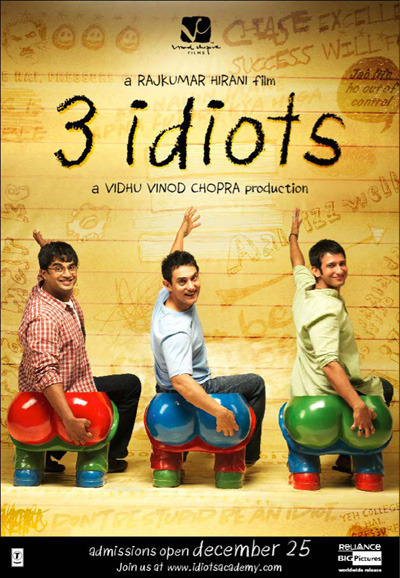
呢個下午,看了我哋創富坊陳慧儀強力推薦嘅《3 Idiots》,一套接近3個鐘頭嘅印度電影。
慧儀形容,呢套係一套好值得睇嘅電影,3個鐘頭一啲悶場都冇,而且佢當中嘅教誨道理,係好適合家長去吸收。
慧儀一啲都冇講錯,戲裡面有笑有淚,諷刺現時代的教育同社會制度,清一色培訓出只會死背誦的機械,讀書只係為成績,背負起父母對自己的期望。
戲裡面,講比我哋知,讀書唔係為左張沙紙,唔係為左做社會名流,而係應該喺自己有興趣嘅方面,努力鑽研。喺學習嘅過程裡面,得到吸收新知識嘅喜悅。但係依家嘅學生,讀書等同於死背爛背,背嘅都係老師要求嘅標準答案。從沒想過只要有好奇心,就會動腦筋發揮創意,活學活用。
而且,每個人有自己嘅興趣同強項,我哋要根據本性,活出屬於自己嘅人生,唔係迎合社會裡面傳統價值觀。
同Steve Jobs嘅道理同出一轍,唔好活在別人的夢裡。Stay hungry, stay foolish.
2011年10月6日 星期四
Steve Jobs, 3 Stories
This is a prepared text of the Commencement address delivered by Steve Jobs, CEO of Apple Computer and of Pixar Animation Studios, on June 12, 2005. I am honored to be with you today at your commencement from one of the finest universities in the world. I never graduated from college. Truth be told, this is the closest I’ve ever gotten to a college graduation. Today I want to tell you three stories from my life. That’s it. No big deal. Just three stories. The first story is about connecting the dots. I dropped out of Reed College after the first 6 months, but then stayed around as a drop-in for another 18 months or so before I really quit. So why did I drop out? It started before I was born. My biological mother was a young, unwed college graduate student, and she decided to put me up for adoption. She felt very strongly that I should be adopted by college graduates, so everything was all set for me to be adopted at birth by a lawyer and his wife. Except that when I popped out they decided at the last minute that they really wanted a girl. So my parents, who were on a waiting list, got a call in the middle of the night asking: “We have an unexpected baby boy; do you want him?” They said: “Of course.” My biological mother later found out that my mother had never graduated from college and that my father had never graduated from high school. She refused to sign the final adoption papers. She only relented a few months later when my parents promised that I would someday go to college. And 17 years later I did go to college. But I naively chose a college that was almost as expensive as Stanford, and all of my working-class parents’ savings were being spent on my college tuition. After six months, I couldn’t see the value in it. I had no idea what I wanted to do with my life and no idea how college was going to help me figure it out. And here I was spending all of the money my parents had saved their entire life. So I decided to drop out and trust that it would all work out OK. It was pretty scary at the time, but looking back it was one of the best decisions I ever made. The minute I dropped out I could stop taking the required classes that didn’t interest me, and begin dropping in on the ones that looked interesting. It wasn’t all romantic. I didn’t have a dorm room, so I slept on the floor in friends’ rooms, I returned coke bottles for the 5¢ deposits to buy food with, and I would walk the 7 miles across town every Sunday night to get one good meal a week at the Hare Krishna temple. I loved it. And much of what I stumbled into by following my curiosity and intuition turned out to be priceless later on. Let me give you one example: Reed College at that time offered perhaps the best calligraphy instruction in the country. Throughout the campus every poster, every label on every drawer, was beautifully hand calligraphed. Because I had dropped out and didn’t have to take the normal classes, I decided to take a calligraphy class to learn how to do this. I learned about serif and san serif typefaces, about varying the amount of space between different letter combinations, about what makes great typography great. It was beautiful, historical, artistically subtle in a way that science can’t capture, and I found it fascinating. None of this had even a hope of any practical application in my life. But ten years later, when we were designing the first Macintosh computer, it all came back to me. And we designed it all into the Mac. It was the first computer with beautiful typography. If I had never dropped in on that single course in college, the Mac would have never had multiple typefaces or proportionally spaced fonts. And since Windows just copied the Mac, it’s likely that no personal computer would have them. If I had never dropped out, I would have never dropped in on this calligraphy class, and personal computers might not have the wonderful typography that they do. Of course it was impossible to connect the dots looking forward when I was in college. But it was very, very clear looking backwards ten years later. Again, you can’t connect the dots looking forward; you can only connect them looking backwards. So you have to trust that the dots will somehow connect in your future. You have to trust in something — your gut, destiny, life, karma, whatever. This approach has never let me down, and it has made all the difference in my life. My second story is about love and loss. I was lucky — I found what I loved to do early in life. Woz and I started Apple in my parents garage when I was 20. We worked hard, and in 10 years Apple had grown from just the two of us in a garage into a $2 billion company with over 4000 employees. We had just released our finest creation — the Macintosh — a year earlier, and I had just turned 30. And then I got fired. How can you get fired from a company you started? Well, as Apple grew we hired someone who I thought was very talented to run the company with me, and for the first year or so things went well. But then our visions of the future began to diverge and eventually we had a falling out. When we did, our Board of Directors sided with him. So at 30 I was out. And very publicly out. What had been the focus of my entire adult life was gone, and it was devastating. I really didn’t know what to do for a few months. I felt that I had let the previous generation of entrepreneurs down - that I had dropped the baton as it was being passed to me. I met with David Packard and Bob Noyce and tried to apologize for screwing up so badly. I was a very public failure, and I even thought about running away from the valley. But something slowly began to dawn on me — I still loved what I did. The turn of events at Apple had not changed that one bit. I had been rejected, but I was still in love. And so I decided to start over. I didn’t see it then, but it turned out that getting fired from Apple was the best thing that could have ever happened to me. The heaviness of being successful was replaced by the lightness of being a beginner again, less sure about everything. It freed me to enter one of the most creative periods of my life. During the next five years, I started a company named NeXT, another company named Pixar, and fell in love with an amazing woman who would become my wife. Pixar went on to create the worlds first computer animated feature film, Toy Story, and is now the most successful animation studio in the world. In a remarkable turn of events, Apple bought NeXT, I returned to Apple, and the technology we developed at NeXT is at the heart of Apple’s current renaissance. And Laurene and I have a wonderful family together. I’m pretty sure none of this would have happened if I hadn’t been fired from Apple. It was awful tasting medicine, but I guess the patient needed it. Sometimes life hits you in the head with a brick. Don’t lose faith. I’m convinced that the only thing that kept me going was that I loved what I did. You’ve got to find what you love. And that is as true for your work as it is for your lovers. Your work is going to fill a large part of your life, and the only way to be truly satisfied is to do what you believe is great work. And the only way to do great work is to love what you do. If you haven’t found it yet, keep looking. Don’t settle. As with all matters of the heart, you’ll know when you find it. And, like any great relationship, it just gets better and better as the years roll on. So keep looking until you find it. Don’t settle. My third story is about death. When I was 17, I read a quote that went something like: “If you live each day as if it was your last, someday you’ll most certainly be right.” It made an impression on me, and since then, for the past 33 years, I have looked in the mirror every morning and asked myself: “If today were the last day of my life, would I want to do what I am about to do today?” And whenever the answer has been “No” for too many days in a row, I know I need to change something. Remembering that I’ll be dead soon is the most important tool I’ve ever encountered to help me make the big choices in life. Because almost everything — all external expectations, all pride, all fear of embarrassment or failure - these things just fall away in the face of death, leaving only what is truly important. Remembering that you are going to die is the best way I know to avoid the trap of thinking you have something to lose. You are already naked. There is no reason not to follow your heart. About a year ago I was diagnosed with cancer. I had a scan at 7:30 in the morning, and it clearly showed a tumor on my pancreas. I didn’t even know what a pancreas was. The doctors told me this was almost certainly a type of cancer that is incurable, and that I should expect to live no longer than three to six months. My doctor advised me to go home and get my affairs in order, which is doctor’s code for prepare to die. It means to try to tell your kids everything you thought you’d have the next 10 years to tell them in just a few months. It means to make sure everything is buttoned up so that it will be as easy as possible for your family. It means to say your goodbyes. I lived with that diagnosis all day. Later that evening I had a biopsy, where they stuck an endoscope down my throat, through my stomach and into my intestines, put a needle into my pancreas and got a few cells from the tumor. I was sedated, but my wife, who was there, told me that when they viewed the cells under a microscope the doctors started crying because it turned out to be a very rare form of pancreatic cancer that is curable with surgery. I had the surgery and I’m fine now. This was the closest I’ve been to facing death, and I hope it’s the closest I get for a few more decades. Having lived through it, I can now say this to you with a bit more certainty than when death was a useful but purely intellectual concept: No one wants to die. Even people who want to go to heaven don’t want to die to get there. And yet death is the destination we all share. No one has ever escaped it. And that is as it should be, because Death is very likely the single best invention of Life. It is Life’s change agent. It clears out the old to make way for the new. Right now the new is you, but someday not too long from now, you will gradually become the old and be cleared away. Sorry to be so dramatic, but it is quite true. Your time is limited, so don’t waste it living someone else’s life. Don’t be trapped by dogma — which is living with the results of other people’s thinking. Don’t let the noise of others’ opinions drown out your own inner voice. And most important, have the courage to follow your heart and intuition. They somehow already know what you truly want to become. Everything else is secondary. When I was young, there was an amazing publication called The Whole Earth Catalog, which was one of the bibles of my generation. It was created by a fellow named Stewart Brand not far from here in Menlo Park, and he brought it to life with his poetic touch. This was in the late 1960’s, before personal computers and desktop publishing, so it was all made with typewriters, scissors, and polaroid cameras. It was sort of like Google in paperback form, 35 years before Google came along: it was idealistic, and overflowing with neat tools and great notions. Stewart and his team put out several issues of The Whole Earth Catalog, and then when it had run its course, they put out a final issue. It was the mid-1970s, and I was your age. On the back cover of their final issue was a photograph of an early morning country road, the kind you might find yourself hitchhiking on if you were so adventurous. Beneath it were the words: “Stay Hungry. Stay Foolish.” It was their farewell message as they signed off. Stay Hungry. Stay Foolish. And I have always wished that for myself. And now, as you graduate to begin anew, I wish that for you. Stay Hungry. Stay Foolish. Thank you all very much.
CNN Tribute to Steve Jobs.
He’s charismatically brilliant and was a great innovator, iSad watching this, thanks for defining our new world.
Steve Jobs (1955-2011)
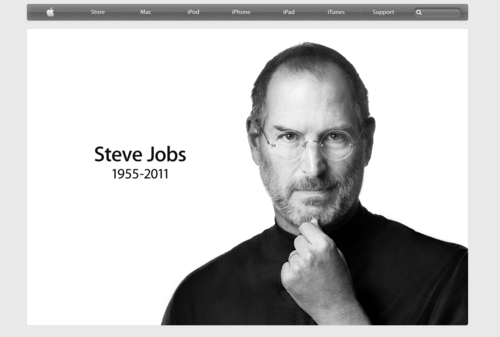
這天我們失去了Steve Jobs,失去了一個影響深遠的先領者。
他定義了這一代的科技與美學,
將創新、工程學、美感完美結合,
創造了Mac、IPod、iPhone、iPad等改變生活的產品。
他以非凡的前瞻性及個人魅力,
創立了Apple、Pixar等只有他才能創立的公司。
這天,少了一個引領我們未來的人。
但,我不會忘記你這個教主。
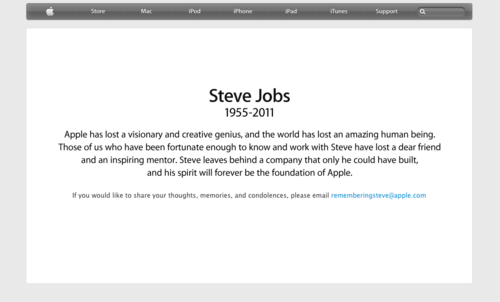
2011年9月25日 星期日
一日內將《APPLE》融入香港
[youtube http://www.youtube.com/watch?v=SfKEO358irg]
香港首間《Apple Store》9月24日揭幕,
千人在開店前排隊準備「朝聖」。
Apple這個品牌有相當的號召力,
而它首日開店的Marketing 功夫,
亦值得香港商人學習。
Apple 以年輕活力一日內將它的文化融入香港。
開幕一刻,
300個外地加本地職員大聲歡呼,
倒數「Five, Four, Three, Two One!」,
再有High到爆的年青職員在兩旁拍手,
帶著亢𡚒笑容和到場人士擊掌,
大叫「Apple!IFC!」,
派發紀念T﹣Shirt。
無錯,佢地仲興奮過啲客。
呢日,唔單止係店舖開張展開銷售業務,
仲係裡面幾百名香港員工開Party,
現場情況似足大學迎新日。
香港人在各媒體中,看到如此情況會有怎麼感覺?
Apple這個品牌很歡欣、很年青,
買家和店員一起為這個蘋果標誌興奮萬分。
本地店員的活力,
除了表現出產品帶來的愉快體驗外,
更加以比在主題公園裡面見到的,更加由心而發的笑容,
告訴全港人,他們好享受這間外國企業提供的工作嘅環境。
以香港人打動其他香港人,
是外國品牌最好的落地方法,
並間接反映公司對本地人的善待。
相比起其他名牌開幕,
千篇一律先找代言人,
再找名模紅星剪綵,
職員恭敬有禮地提供貴賓式的服務,
Apple Store這種狂歡的揭幕方式,
令我諗:「入去做野應該幾好玩喎~」。
飲飽食醉是容易極的快樂,
但層次高一點的幸福,
即使在你眼前,你同我都未必有足夠的智慧和曆練去捕捉。
心裡總是有一道缺口無法填補,迷茫從此而來。
壓力源於自己,卻施於別人,渴望他為你填補那一種自己都未搞清楚的空虚感。
你還會有怎麼感想需要痛哭?還欠缺怎麼東西不夠滿足?
2011年9月18日 星期日
熱血爆棚、但夠ROCK夠動聽的《我們國父》,
叫年青人要復古孫中山「文哥」的革命精神,
當自己心中有目標時,就不怕爆肝十次也要堅持,
加一點點計劃,繼續前進!
燃燒青春吧!不要無聊過日子了!
(歌曲由台灣新組合﹣中山路100號送上)
2011年9月16日 星期五
A股術語通通識
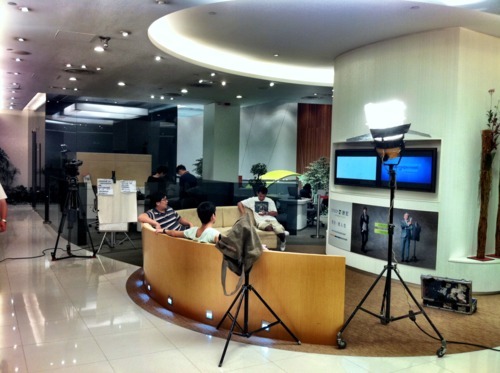
第一次出外景拍攝自己負責的環節《A股術語通通識》,
加入TVB一年多了,才有這樣的機會,說起來真的有點慚愧,
這次有機會做WRITER 應該做的事,有股滿足感在心裡浮現。
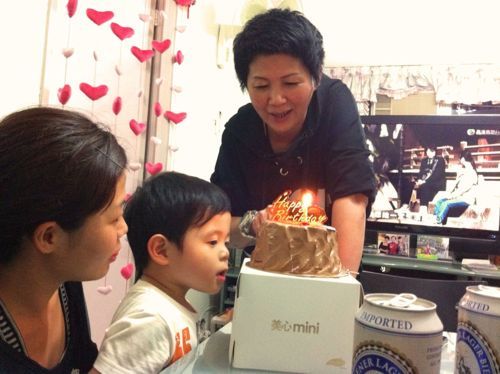
又食媽媽的生日飯了,已是這年第三次,她要食幾多次才滿足呢?
不是生日的表弟宥宥又搶著吹蠟燭了,他又要吹幾多次才滿足呢?
2011年9月13日 星期二
2011年8月28日 星期日
先成功,後快樂?
如果問你,先成功後快樂,抑或是先快樂後成功?
大部份人都在想,「如果我找到工作,我便會快樂。」,「如果我成功升職,我便會快樂。」等等。他們對於快樂的方程式是︰努力一點,搏取成功,然後我便會快樂。
快樂總是在成功之後,最後變得遙遙無期。
你是這樣嗎?
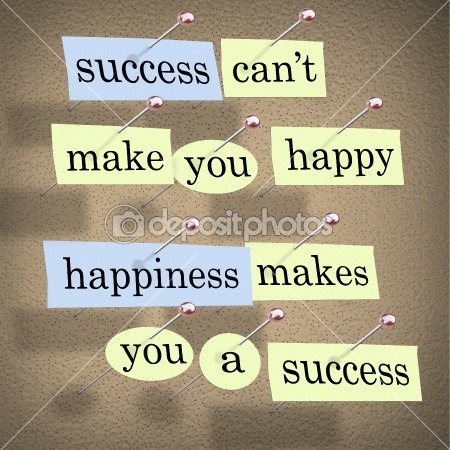
佛學有云,苦難來自個人的執著,他們心性昏闇未明,因此很珍惜自己,同時關心自身所經歴的事物,特別是他們的好惡與得失。這種執著,令我們在生存的過程中受苦。
可是,眾生皆「無常」,任何事物都在轉變,不是我們得夠操控、阻止的。就算你努力後得到追求的成果。然而,從遠處看,你是得到你所追求的,但靠近一點觀察,它還是和你心中的結果不一樣。
也許的周遭的環境已經改變,也許你受慾望驅使要求更上一層樓,也許你執著於擁有的地位,一直害怕失去。
既然,結果就是不會如你所想,又何必去期待或渴望呢?
生活於這個勞勞役役的年代,我們已把自己當成機械人。生存目的是不斷完成各種「任務」,每日也有不同的To-dos。但我們是有血有肉有感受的人,要改變這種機械人的模式,就要懂得從工作、家庭、困境中培植出快樂,成為一個「感受生活的人」。當你擁有快樂的時候,你反而會更易達到你一直追求的目標,包括快樂本身。
這裡有培植快樂的5點,持之而行21日,使之改變你的機械人思想習慣︰
1. 電腦、網誌或日記上,記下3樣使你愉快的新事物,培養樂觀情緒
2. 用2分鐘記下一件正面的事,以及你的感受,這可使你懂得感受身邊值得快樂的事
3. 運動10分鐘
4. 打坐入定2分鐘,感受自己的呼吸,這有助消除苦惱、負擔及困擾
5. 以言語或文字感謝一個身邊的人
譚偉丞
2011年8月27日 星期六
“After a while you learn the subtle difference between holding a hand and chaining a soul, and you learn that love doesn’t mean leaning and company doesn’t mean security, and you begin to learn that kisses aren’t contracts and presents aren’t promises, and you begin to accept your defeats with your head up and your eyes open, with the grace of an adult, not the grief of a child, and you learn to build all your roads on today because tomorrow’s ground is too uncertain for plans. After a while you learn that even sunshine burns if you get too much. So plant your own garden and decorate your own soul, instead of waiting for someone to bring you flowers. And you learn that you really can endure… that you really are strong, and you really do have worth.”
~Veronica A. Shoffstall
2011年8月22日 星期一
總是重複著同一個幼稚的習慣。
2011年8月14日 星期日
久謂的胃痛

幾年未試過胃痛,今次一痛就痛足兩日,兩晚瞓覺都痛到醒左,
今日一起身去睇醫生,醫生話只係機能失調,
結果二百幾蚊拎得幾粒胃藥,令到肉痛多過胃痛。
依家個胃好似過份活躍咁,感覺到胃酸好似「爸爸」聲流出黎,
食幾多野都好,好快就會消化晒,
每兩個鐘就要食一餐,因為個肚一空,個胃就會乸住痛…
2011年8月4日 星期四
2011年7月16日 星期六
卓韻芝死去活來ONE NIGHT STAND

最喜愛的電台主持卓韻芝,是香港第一個女性以個人身份舉行棟篤笑。比起她近來出位的打扮,我更仰慕她愛玩得來,見識廣博,有能力將話題深入淺出的表述,而且精心舖排並佈滿幽默感。
這場棟篤笑,她的表現完全達標,令我真心笑足全場,還出現笑得不能自控的尷尬情況,全靠她多年電台發聲的經驗,掌控節奏和觀眾情緒功夫到家。
最喜歡她說到同性戀朋友的百態和外婆的攪笑言行。
她取笑余迪偉and friends 的肢體動作特徵,講到一同𥄫健碩撘棚工人的情況,以及她飲醉酒嘔吐的時候,她的同性戀朋友只會彈開,然後叫她靠前一點,不要嘔到高跟鞋…對於卓韻芝,這便是朋友。
而她外婆知道她要攪棟篤笑之後,每次也捉著這一點包裝指駡。例如,「又話做棟篤~又唔摺被~唔摺被間房咪亂~亂咪有箘~有箘咪病~病咪做唔到棟篤囉~」。「又話做棟篤」成為了我這夜的口頭襌。
阿芝也講述了她遊學的趣事及自殺的經過。
這場的嘉賓是鄭伊健,看到他被阿芝玩弄和摸胸,只想到遇上阿芝這個轉數極快的人,算你不好運。
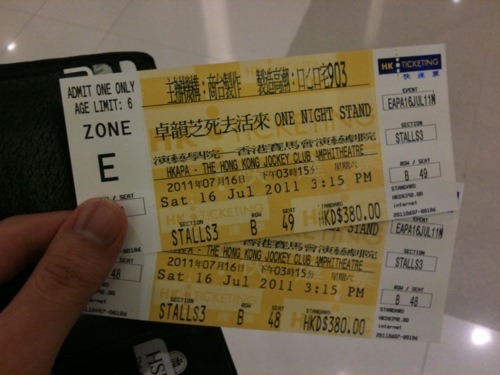


2011年7月1日 星期五
那誰沒有下次 X 那誰買不到飛
[youtube http://www.youtube.com/watch?v=lmE6wxztzR8&w=520&h=390]
你坐係電腦前面,嘗試係搜尋引擎入面輸入how to buy,自動彈出既第一個聯想語句,亦即係全球被搜尋次數最多既語句:係「how to buy 卓韻芝 one night stand 嘅飛」。
點樣先至可以買到 one night stand 既飛?我可以好肯定話俾你知,無方法,你話,慾望會隨時間丟淡,我明呀,問題係我依家買唔到飛呀。
其實呢,買到飛係好犀利。你知唔知點解呢個世界咁悶?因為十居其九都係想買就買到嘅野,買到阿芝飛唔同,買飛係學唔黎嫁,唔係人人得嫁,但你竟然買到呀。
飛都買到咯,去埋睇咯。
REF:卓韻芝BLOG
Dia didn't get it in The Voice

Feeling sad that Dia Frampton didn’t win in The Voice season 1. She is my favorite, and her voice is so unique. I’ll definitely download her songs in itunes once I get the itunes gift cards.
2011年6月12日 星期日
Must watch show in the coming season, “Expedition Impossible” of ABC. A new reality show similar to Amazing Race, but with much more wild and extreme conditions, the casts can take no taxi, live in no hotel! And it’s made by the producer of “Survivor”. Attractive enough?? Premieres on 23rd June.
2011年1月13日 星期四
民意調查=民意?

記得當年求學時期,一科「民意調查」弄得大家頭昏腦漲,每人要致電上千個電話做訪問,然後撰寫調查報告交功課。今日看到新聞講述政府有操控「申亞調查」結果之嫌,才意識到「民意調查」這科目的重要。不僅要學懂做調查,更要學懂分析調查的可信性。
還記得,「民意調查」這科目,首先要學懂設計問卷。從問題內容到問題的種類,都要貫徹客觀、完整,字眼要中性,而答案要包含所有可能性。教授更重點提醒我們,引導性問題更是大忌,操控民意取得想要的結果是非道德所為。
誰料到,香港特區政府一直委託/贊助大學進行的問調,是絕對不合格的。竟出現以下引導得離譜的問題︰
「有意見認為,舉辦亞運會可以提高香港人嘅公民自豪感,加強社會凝聚力,你有幾贊同呢個意見呢?」
「假如今次七一有幾十萬人上街遊行,出現動亂,被美國人混水摸魚,這個責任,是否該由民主派來負?」
民調結果更只抽取合符自己預設觀點來公佈,而被委託的大學因合約,合約金的約束,即使民調結果被扭曲也不可以企出來反撲。這次反映出,政府公信力何在?而我更擔心,普通市民看到這篇報道,明白箇中道理嗎?我認為,民意調查應成為通識科中其中一個課題。
(REFERENCE:110113 MINGPAO)
2011年1月3日 星期一
Panda Cow: New Breed of Miniature Cow Born.
A very cute breed of cow, with markings that resemble those of a panda. There are 25 of them, and this is the youngest called Ben. Love his short soft white hair on his head, and tame like a little dog sitting upon the lap.
2011年1月2日 星期日
借東西の小矮人亞莉亞蒂’s theme song. Surprised to know it’s performed by a French singer Cecile Corbel. Her mystery voice is really relaxing, and fit the movie.
Stop Dreaming About Killing Your Boss (or How to “Manage Up” for a Happier Workplace)
 Traditionally we think of the hierarchy in the workplace as top down, but if top down is making you tear your hair out, you may benefit from managing from the bottom up—guiding your boss from the trenches.
Traditionally we think of the hierarchy in the workplace as top down, but if top down is making you tear your hair out, you may benefit from managing from the bottom up—guiding your boss from the trenches.











